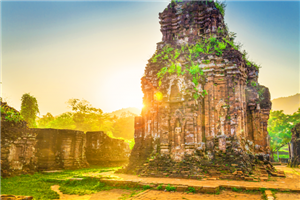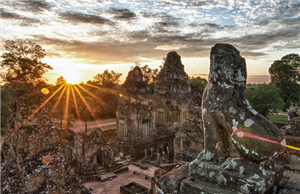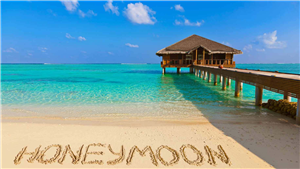Vietnam's festivals follow the Chinese lunar calendar – the country’s culture and festivals are strongly influenced by the country’s past as a Chinese vassal state. Thus many of the festivals in the list below are moveable relative to the Gregorian calendar; while the dates relative to the lunar calendar do not change, the dates relative to the Gregorian calendar do.
Some of these festivals are celebrated nationwide; as some provinces have their own series of festivals unique to the locals, we’ve tried to include some of the more notable local ones too.

Image © Andy Wright/Creative Commons
Hoi An Full Moon Festival
Every 14th day of the lunar month, Hoi An’s old town bans all motorized traffic and transforms itself into a massive performance venue for Vietnamese arts contemporary to the old trading town’s heyday in the 18th to 19th century – Chinese opera, Chinese chess, and of course, the region’s famous food.
Shops put up brightly-colored lanterns, turning the narrow old streets (even theold Japanese bridge, pictured at left) into a radiant, festively-illuminated light spectacle, augmented by the haunting strains of traditional music audible from just about everywhere in the old town. Just for the night, you won’t be required to buy or show a ticket to enter Hoi An’s old attractions. The temples are at their busiest during the Full Moon Festival, as the locals honor their ancestors during this auspicious time of the month.
To see the Gregorian calendar dates for the 14th day of each lunar month, check out this handy tool: Online Chinese/Gregorian Calendar - ChineseTools.EU (offsite).

Image courtesy of Getty Images
Tet is Vietnam's equivalent to the Chinese New Year, and is just as auspicious . The Vietnamese consider Tet to be the year's most important festival. Family members gather in their hometowns, traveling from across the country (or the world) to spend the Tet holidays in each other's company. On the stroke of midnight, as the old year turns into the new, Vietnamese usher out the old year and welcome the Kitchen God by beating drums, lighting firecrackers, and goading dogs to bark (a lucky omen).
The Tet Festival takes place on the 1st day of the 1st month of the Chinese lunar calendar. Relative to the Gregorian calendar, Tet occurs on these dates:
-
February 10, 2013
-
January 31, 2014
-
February 19, 2015
-
February 8, 2016
Image © Nguyễn Đông Sơn/Creative Commons
Lim Festival
On the 13th day of the first lunar month, visitors come to Lim Hill in Bac Ninh province to watch performances of "quan ho", traditional songs performed by both men and women from boats and from the Lim Pagoda. The songs cover numerous topics, such as greetings, exchanging love sentiments, and even trivial objects like village gates. Bac Ninh is only twenty minutes' drive from Hanoi, and worth a side trip after exploring the capital's must-see sights.
The Lim Festival takes place on the13th day of the first lunar month of the Chinese lunar calendar. Relative to the Gregorian calendar, the festival occurs on these dates:
-
February 22, 2013
-
February 12, 2014
-
March 3, 2015
-
February 20, 2016

Image © MsAnthea/Creative Commons
Perfume Pagoda Festival
The Perfume Pagoda is Vietnam's most famous Buddhist pilgrimage site, welcoming hundreds of thousands of pilgrims who arrive at the sacred cave to pray for a happy and prosperous year ahead. This stream of pilgrims reaches its peak at the Perfume Pagoda Festival - devotees travel through a picturesque gauntlet to the sacred caves, first boarding boats that pass a landscape of rice paddies and limestone mountains, then going by foot past historical shrines and up hundreds of stone steps.
The Perfume Pagoda Festival takes place on the 15th day of the first month of the Chinese lunar calendar. Relative to the Gregorian calendar, the festival occurs on these dates:
-
March 26, 2013
-
February 14, 2014
-
March 5, 2015
-
February 22, 2016

Image © Casablanca1911/Creative Commons
Phu Giay Festival
At Phu Giay Temple in Nam Dinh province, tribute is paid to Lieu Hanh, one of the Vietnamese "four immortal gods", and the only one based on a real person (a princess of the 16th century who died young). Many devotees from all over make a pilgrimage to Phu Giay Temple, located about 55 miles east from Hanoi, to join the festival, taking advantage of the traditional lull in work during the third lunar month. Traditional diversions like cock-fighting, "keo chu", and folk singing are held all throughout the festival.
The Phu Giay Festival takes place on the 1st to the 10th day of the 3rd month of the Chinese lunar calendar. Relative to the Gregorian calendar, the festival occurs on these dates:
-
April 10-19, 2013
-
March 31-April 9, 2014
-
April 19-28, 2015
-
April 7-16, 2016
Image released into public domain
Hue Festival
A biennial (once every two years) festival celebrated in the former imperial capital of Hue, the Hue Festival last took place from April 7 to 15, 2012, and the next one is scheduled to occur on April 12 to 20, 2014. The Festival condenses the best of Hue’s culture into a single week-long festival: theater, puppetry, dance, music, and acrobatics will be performed in different places around the city, although most of the activities are conducted around the grounds of the Hue Citadel.
Chu Dong Tu Festival
Downstream from Hanoi on the Red River, the Da Hoa and Da Trach temples in Khoai Chau district host a festival to Chu Dong Tu, one of the four immortal gods worshiped by the Vietnamese. The festival is topped off with traditional games and activities like human chess, wrestling, and Vietnamese dances.
The Chu Dong Tu Festival takes place on the 10th to the 12th day of the second month of the Chinese lunar calendar. Relative to the Gregorian calendar, the festival occurs on these dates:
-
March 21-23, 2013
-
March 10-12, 2014
-
March 29-31, 2015
-
March 15-20, 2016

Image © Nguyễn Thanh Quang / Creative Commons
Thay Pagoda Festival
If any Buddhist monk deserved worship, it was Tu Dao Hanh, innovator and inventor. He made numerous advances in medicine and religion, but is mainly remembered for inventing Vietnamese water puppetry. The Thay Pagoda Festival celebrates Tu Dao Hanh's life with a procession of the monk's worshipping tablet, borne by representatives from four villages. The festival is celebrated by laymen with many water puppetry performances, particularly at the Thuy Dinh House in front of Tu Dao Hanh's pagoda. The Thay Pagoda is located about 18 miles southwest from Hanoi, or about a 30 minute drive from the capital.
The Thay Pagoda Festival takes place on the 5th to the 7th day of the third month of the Chinese lunar calendar. Relative to the Gregorian calendar, the festival occurs on these dates:
-
April 14-16, 2013
-
April 4-6, 2014
-
April 23-25, 2015
-
April 11-13, 2016

Image © Thang Nguyen / Creative Commons
Hung Festival
This festival celebrates the legendary birth of Vietnam’s first kings, the Hung Vuong. Details of their origin remain sketchy, but the story has become rather embellished over the years: born from the union of a mountain princess and a sea dragon, the Hung Vuong came from a hundred sons hatched from a hundred eggs laid by said princess. Half the sons went back to the sea with their father, while the rest stayed behind with their mother and learned to rule.
To remember the valiant sons of this lineage, people gather at the Hung Temple, located near Viet Tri city in Phu Tho province, about 50 miles from Hanoi. Festivalgoers light incense, make offerings, and beat bronze drums at the temple, then join a temple fair, which includes entertainments like traditional Vietnamese operas and sword dances. This holiday is traditionally celebrated on the tenth day of the third lunar month; as of 2007, the Vietnamese government declared this to be a nationwide holiday. Relative to the Gregorian calendar, the festival occurs on these dates:
-
April 19, 2013
-
April 9, 2014
-
April 28, 2015
-
April 16, 2016
Lang Ca Ong (Whale Festival)
Vietnamese fishermen believe whales are their protectors on the high seas. The Lang Ca Ong festival thanks the whales for their support and prays for prosperity in the coming year. This festival occurs in the middle of the third lunar month, and is common in fishing communities throughout Vietnam. Devotees offer prayers to the whale god for his continued protection, and proffer sacrifices (which do not contain seafood). At dawn on the second day, a fluvial procession is performed to propitiate the whale gods.
The Whale Festival takes place on most of the month of April.







Older News